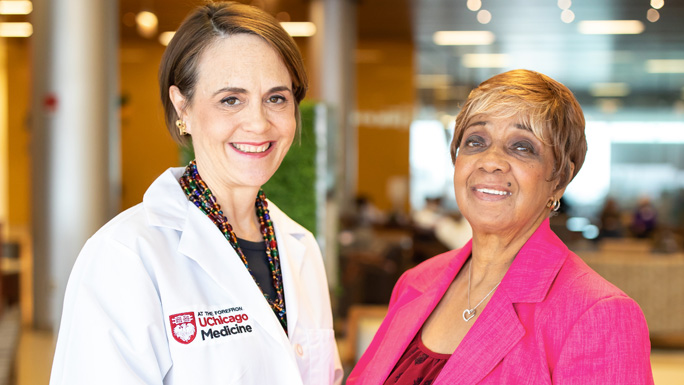“When we treat people for cancer, it’s not just to live longer,” begins Dr. Jessica Donington. “It’s longer and better. I don’t want to buy you bad time.”
Donnington, the chief of thoracic surgery at the University of Chicago, specializes in two of the most insidious and aggressive cancers—lung cancer and mesothelioma. Unlike other forms of cancer which can be caught in the early stages—like breast or skin cancer—lung cancer or mesothelioma patients typically receive their diagnoses after they’ve begun presenting late-stage symptoms. Mesothelioma patients in particular face grim odds. According to Asbestos.com, 40 percent of mesothelioma patients survive at least one year. But only 52 percent of peritoneal mesothelioma patients and a mere 12 percent of pleural mesothelioma patients survive five years.
That is why finding effective and harm-reducing treatments is so key in the mesothelioma world. “With meso, I do think the quality of what we give [patients] is so, so important because this is a rough disease,” Donnington says. “It really can impact people quite dramatically.”
The University of Chicago (U of C), unlike other facilities, has embraced a holistic approach to treating the rare and deadly disease. Donington’s team is led by Hedy Lee Kindler, M.D., the medical director of gastrointestinal oncology and director of U of C’s mesothelioma program. “We work under her direction because she’s really brilliant,” Donington says. In addition to Kindler, their program also includes surgeons, radiation oncologists, radiologists, pathologists, nutritionists and palliative care.

Nearly all patients who come to U of C’s mesothelioma program first see Kindler. Later, patients are assessed to see if surgery is an option. This is where Donington comes in. Donington primarily performs pleurectomy/decortication surgeries for pleural mesothelioma patients, a lung-sparing procedure that removes the pleural lining and other diseased tissues around the lung as well as any visible tumors on the surface of the lung or the remaining chest.
According to Donington, pleurectomy/decortication is a more difficult surgery than the preceding and more common extrapleural pneumonectomy, which removes the lung entirely. “Most of my lung cancer patients go home in about two days; these patients stay more like six days,” Donington says.
But the benefits for the patient are well worth it. While she was at New York University, Donington worked with Dr. Raja Flores, the chairman for the Department of Thoracic Surgery and a professor of Thoracic Surgery at The Mount Sinai Medical Center. Flores and Donington found that patients who had an extrapleural pneumonectomy had an overall poorer recovery than those who had the pleurectomy/decortication. “We didn’t feel like they ever really got all the way back to baseline,” Donington says. “Like they were always a bit hampered by their operation.”
Treating mesothelioma, therefore, requires sobering realism. “The patients are all going to recur. It’s that kind of disease. We cure so few,” Donington adds. But with a pleurectomy/decortication, patients are left much stronger and able to receive more treatment, including radiation and chemotherapy. Pneumonectomy patients—often too weak, frail, short of breath or emaciated—could receive no further treatment, and ultimately died.

“I don’t want to buy you time in the hospital. I don’t want to buy you time on oxygen. I don’t want to buy you time when you can’t enjoy your life, and I think with pneumonectomy, we were doing that,” says Donington. “When we do the pleurectomy/decortication and leave them with two lungs, the time we buy them is better time. Maybe that’s the better message to tell.”
Although surgery has proven to be beneficial to many mesothelioma patients, it is not an option for all meso patients. “I actually think it’s probably an option only for a small percentage of them,” Donington says. Donington prefers to operate on patients with epithelial disease—affecting the epithelial tissues lining the surfaces of our skin, our digestive organs and our respiratory organs—rather than those with sarcomatoid disease.
The mesothelioma should also be fairly low volume. “It’s hard once it’s in the fissures. It’s hard if there’s dense disease,” Donington says. “The hardest thing is if it’s growing into the chest wall or the mediastinum. Those are the kind of things that make people inoperable.” And patients should be fairly young and pretty healthy. “It’s not like we would say no to someone who’s in their 80s, but it’s tough, and someone who’s elderly has significant comorbidities or is frail,” she says.
Steps in the advancement of treatment toward mesothelioma are not as common as other forms of cancer, but Donington remains hopeful that new developments are on the horizon and many of them may develop through the University of Chicago’s unique program. “The steps of meso are all small, but we’re all making them. There’s no doubt about it,” Donington says. “We do have new medicines, we do have more effective treatments. We are better at marrying all of our different treatments together. So that just needs to continue.”







